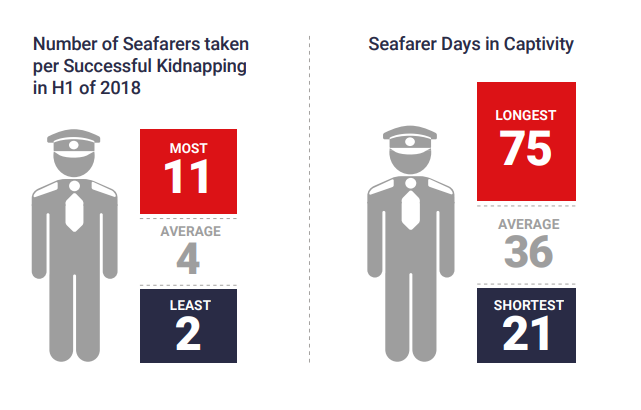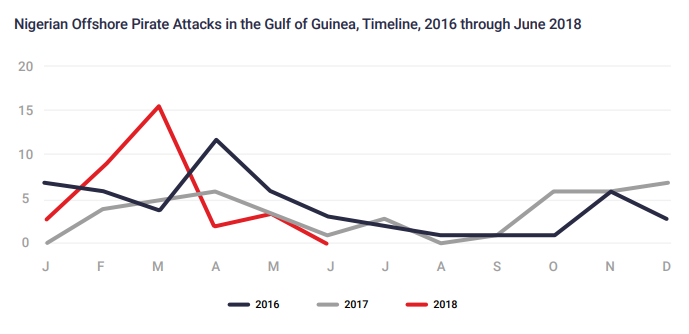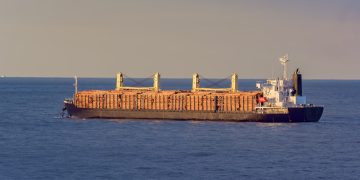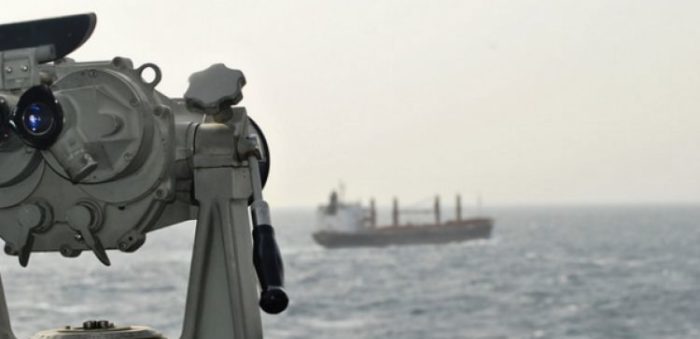A total of 35 seafarers were kidnapped for ransom in the Gulf of Guinea in the first half of 2018, same as during the first half of 2017, according to a new paper issued by security firm EOS Risk Group, presenting figures on Nigerian piracy. 95% of attacks on merchant vessels in the region during this period occurred Between Brass and Port Harcourt, within 60nm of the shore, the report reads.
Highlights
- At the close of 2017, maritime piracy activity in the Gulf of Guinea had become static.
- Nigerian pirate action groups (PAGs) were focused on the kidnap of seafarers for ransom, operating almost exclusively in the waters off Bayelsa and Rivers states, where most active pirate enclaves are located.
- The frequency of attacks in 2017 was largely consistent with patterns observed in 2016, but the number of seafarers taken hostage offshore increased significantly by 44% from 52 to 75. This was a product of a growth in the number of seafarers being taken per attack (3.25 in 2016 rising to 5.35 in 2017) and a slight improvement in PAGs’ boarding success rate.
- Outside of ‘pirate alley’, stretching out to 115nm off the Niger Delta, piracy activity throughout the rest of the Gulf of Guinea, including Lagos, was confined to port-based criminality.
 Notable is that this period marked the return of ‘petro-piracy’ (tanker hijackings for product theft) in the Gulf of Guinea following two years of dormancy, as on 10 January 2018, Nigerian pirates hijacked the UK-flagged MT Barrett in Cotonou Anchorage, Benin.
Notable is that this period marked the return of ‘petro-piracy’ (tanker hijackings for product theft) in the Gulf of Guinea following two years of dormancy, as on 10 January 2018, Nigerian pirates hijacked the UK-flagged MT Barrett in Cotonou Anchorage, Benin.
The attack saw the pirates siphon off around 2,000 MT of gasoline from the tanker via a shipto-ship transfer (STS) within the Exclusive Economic Zone (EEZ) of Ghana. The pirates eventually abandoned the MT Barrett off the Niger Delta on 17th January, leaving behind a damaged vessel and traumatised crew.
Following this incident, pirates attacked three other tankers in Cotonou anchorage in February 2018. On 1st February, the Panama-flagged tanker, MT Marine Express, with 22 Indian nationals onboard and laden with 13,500 tons of gasoline, was hijacked by around 13 pirates from Cotonou anchorage, Benin. Managers Anglo-Eastern reported that the vessel was released 6 days later, its crew safe and cargo intact.

Contemporary hijack for oil theft cases have demonstrated that even though piracy in the Gulf of Guinea is Nigeria-centric, petro-pirates tend to rely on multinational networks of informants, buyers, ex-seafarers and sponsors, making it a regional problem,
…explains Jake Longworth Senior Intelligence Analyst, EOS Risk Group, and the author of the report.
According to the report, petro-piracy in the Gulf of Guinea is unlikely to reach the levels witnessed in 2011-2013, as shipping community have learned some lessons, whilst pirates are using old tricks.
That said, continued instability in the Niger Delta, endemic regional corruption issues, opaque emerging oil industries and weak maritime security suggests the threat will linger. The unpredictable nature of hijack for oil theft operations also makes the issue difficult to police. Unfortunately, tankers stationed at major anchorages and STS zones throughout the Gulf of Guinea are likely to face an underlying risk of this type of crime for the foreseeable future.
Explore more herebelow:
































































